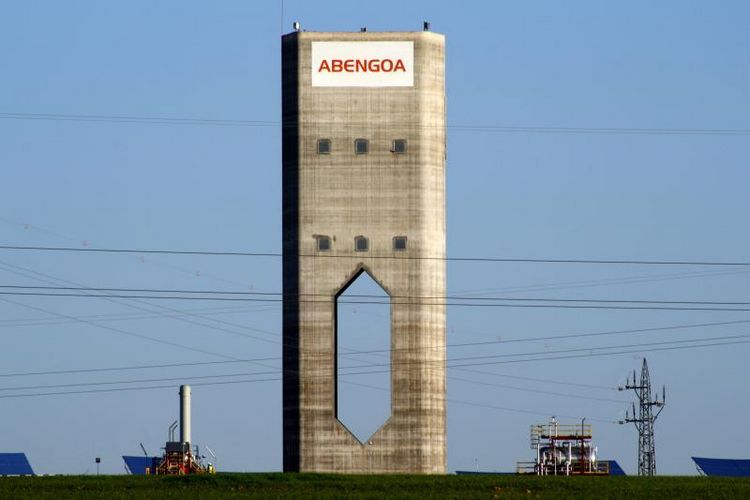When Abengoa issued a €375m high-yield bond in April it was billed as the final step in the Spanish energy company’s rehabilitation in the international debt markets, after its accounting practices spooked investors at the end of 2014.
Less than four months later, however, the bond is worth barely more than half its face value. Issued at 97.954 to yield 7.5%, the 2020 note declined to a price of just 52.25 to yield more than 26% on Tuesday morning, according to Tradeweb.
The drastic turnaround in sentiment has largely been driven by concerns that Abengoa’s liquidity position is insufficient to maintain its complex web of debt facilities, which worsened after the firm’s shock announcement on Monday that it is looking to raise further equity to shore up its balance sheet.
While Abengoa reported a €1.6bn cash position in June, €1.4bn is tied up as collateral for reverse factoring facilities.
During a fraught three-hour conference call following its first half results on Friday, the company’s CEO and co-CFO were forced to deny that the proceeds from the April bond, earmarked to partially redeem a 2016 note in the fourth quarter, had actually already been used to repay other corporate debt.
One hedge fund investor questions why - if the company still has the cash - it would not repay the bond now.
“You’re paying double interest unnecessarily by leaving the other bond outstanding. Besides which it would massively restore confidence if they made a debt repayment.”
During the call, Abengoa’s co-CFO Ignacio Garcia Alvear told investors that the 2016 bond is its only significant debt maturity next year. But the focus is shifting to more esoteric parts of the company’s capital structure, including margin debt and CDS-linked notes issued out of a special purpose vehicle.
Soaring CDS
Abengoa drastically cut its free cashflow guidance last Friday after revealing it will have to stump up much more cash than expected to develop projects. In Brazil alone, the company expects a €1.5bn investment bill for the rest of 2015 and 2016.
“It’s not that we are in love with capex or anything,” said chief executive Santiago Seage. “We try to make profitable investments.”
Abengoa has financed the capital intensive early stages of projects through a wide variety of different vehicles this year.
Abengoa Greenbridge, which funds the early stages of the company’s projects, has issued notes backed by credit default swaps throughout the year taking the total outstanding up to €300m, according to two investors.
The CDS-linked nature of the programme may explain why Abengoa changed last month its convertible bond guarantees in an effort to stop “some players” taking irrational positions on its CDS.
This move has backfired spectacularly, however, with the upfront cost of buying five-year protection soaring from 28.75% before the changes were announced on July 23 to more than 50% on Tuesday.
But Seage said on Friday’s conference call that Abengoa’s CDS prices “have not had any impact on our business whatsoever”.
Margin debt
Abengoa has financed the early stages of projects using other alternative means this year.
On June 29, Abengoa took out a US$200m two-year margin loan for financing “the promotion, development and construction” needs of Abengoa Concessions Investments Limited.
The company posted a 14% stake in Abengoa Yield as collateral. Abengoa Yield is a US-listed entity that has bought a number of Abengoa’s operating assets.
Abengoa Yield’s share price stood at US$32.22 on June 29 but has since tumbled more than 26% to just US$23.81, raising concerns that Abengoa might have to post more collateral against the loan if it declines further.
Hefty collateral
It’s not just bridge finance that is drawing close examination, however.
It emerged last week that a lender to Abengoa’s euro loan facilities A and B was looking to sell out of its position at prices as low as 72.
Abengoa has been fully drawn on these debt facilities since the first quarter of this year and rumblings of possible sellers has fostered scrutiny of its other bank facilities.
Banks provide the company with reverse-factoring facilities called “confirming lines”, allowing it to pay suppliers within 180 days. Abengoa had €2.2bn of confirming lines outstanding as of June, but does not class this as corporate debt.
A note published by Berenberg’s fixed-income sales and trading desk last month described these confirming facilities as “very similar to short term financial debt.”
It is these facilities that tie-up the €1.4bn of Abengoa’s cash.
The company has tried to shift from collateralised bank financing to bond finance for supplier payments in the past, raising short-term dollar notes out of a reverse factoring SPV called Greensill Capital last year. But it has since repaid these notes, with the programme lying dormant this year.
